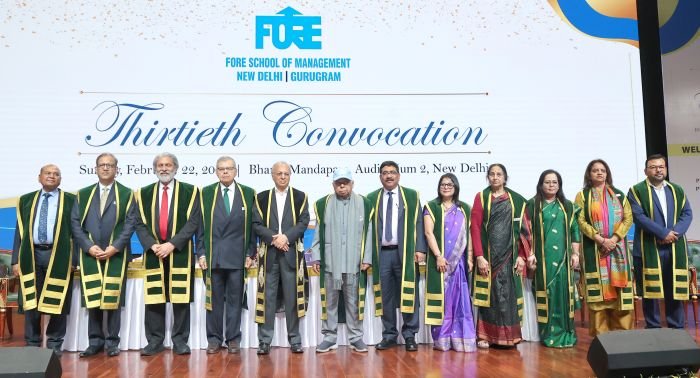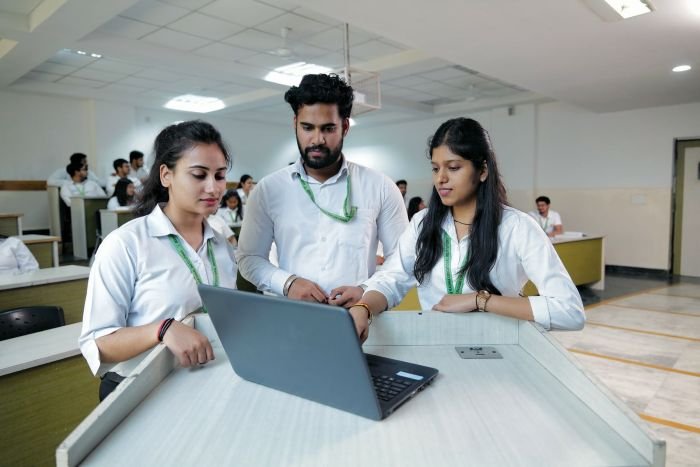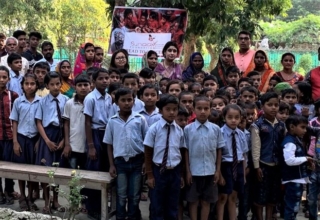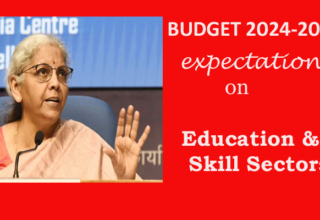
‘Our ask for the Education Sector is clear and pivotal for India’s future growth and development. Over the past decade, government spending on education has regrettably declined from 3.1% to 2.9% of GDP. To effectively address the critical needs of Education, Higher Education, Skills Development, Faculty Competency Development, and enhancing the employability of our graduates, upcoming Union Budget must prioritize education’
In words of V.P Singh, Program Director at the Great Lakes Institute of Management, Gurgaon, one of the major challenges towards achieving the goal of ‘Viksit Bharat’ is the big gap in IQ level of India and other competing countries. India with an average IQ level of 77 with a rank 96 attempts to compete with China that has an IQ of 104 and ranked 5th. “Major efforts need to be made to raise the IQ level given the global growth is so much dependent on path breaking technologies. Apart from general IQ level the government needs to enhance the Artificial Intelligence quotient too. This would require giving a massive boost to the education sector this year. Just like the massive boosts given to agriculture in 2019 and to capex in all the past budgets in last 10 years, education is the sector to emphasize now. The proportion of knowledge economy is rising in the world. Spending on education will complement growth in all sectors,” he says.
Ravichandran V – Chairperson & Trustee, eVidyaloka prescribe an increase in spending on Education and Skills Development to 6% of GDP initially, with a progressive target of reaching 7% over the next five years to ensure that our education system is adequately resourced to meet the challenges of the 21st century and beyond. “Next, the establishment of a dedicated Higher Education Commission can play a pivotal role in aligning education with employability, focusing on skill development for employment, fostering collaborations with renowned international universities, and internationalizing the approach of our universities to elevate select institutions into the global Top 200 rankings,” he further says.
Abhishek Gupta, CEO, Rau’s IAS Study Circle says India needs to become rich before getting old. Hence, Education remains critical to reaping demographic Dividend and realizing vision of Viksit Bharat. “Budget should lay down a roadmap to increase expenditure on Education to 6% of GDP in line with National Education Policy 2020. A Comprehensive programme (on lines of Poshan 2.0) to improve learning outcomes at Primary Education through Early Childhood Care and Education, Teacher Training, Redesigning Curriculum etc.must also be announced. Overall, the focus of the Budget should be on “Padhega India, Tabhi Toh Badhega India”.
“As we near Union Budget 2024-2025, we look forward to a substantial increase in budgetary allocation for education and skill development to about 6% of the GDP which will be vital to reach the full potential of NEP 2020. We anticipate policies that support public-private partnerships, enhancing the reach and impact of our skilling efforts. A focus on sustainable employment opportunities will not only uplift individuals but also drive the economic growth of our nation,” says Pankaj Jathar, CEO of NIIT Ltd.
With ambitious GER in Higher Education, target, the use of technology and online education are the only ways to provide millions of additional students with higher education. Online education is more difficult to monitor, measure, and improve than the conventional mode, which itself is plagued by poor learning outcomes. “The government must take supervisory steps to ensure higher education’s quality and learning outcomes. Public policy needs to outline a roadmap for how we deliver crucial learning skills to millions of students right from primary education through to higher education, advises Prof. Vidya Mahambare, Union Bank Chair Professor of Economics and Director, Great Lakes Institute of Management, Chennai.
Jitendra Karsan, Chairman, Safari Kid say it is imperative that the Government implements significant policy changes in the new budget as the critical role of preschools in laying a strong foundation for future generations needs to be recognized. “Early childhood education is essential for every child’s development, yet the current Goods and Services Tax (GST) rate of 18% on the rent of educational premises imposes a considerable financial burden on parents. To ensure that quality early education is accessible and affordable for all families, it is crucial to reduce the GST rate from 18% to 6%. This change would help alleviate the financial strain on parents and support the goal of making early childhood education universally available,” he adds while batting for increasing tax benefits for women entrepreneurs and teachers, especially those involved in early childhood education.
There is optimism that this budget will bring notable initiatives to boost the education sector and enhance digital efforts in taking education and skilling to more youth.
The expectations from this budget for Manikanth Challa, Founder & CEO, Workruit are centered on continued support for digital infrastructure and technology-driven solutions that can streamline recruitment and foster entrepreneurial growth. “Many colleges and educational institutions are still lacking in technology, infrastructure, and resources. Several institutions are struggle with outdated computer labs, limited access to high-speed internet, and insufficient training programs for both students and faculty says . These gaps hinder the ability of institutions to adequately prepare students for a tech-driven job market. Last year’s budget did not allocate sufficient funds to address these critical areas, leaving a significant portion of our educational infrastructure under-equipped for the future. We believe that the upcoming budget should prioritize substantial investments in educational technology and infrastructure. This includes upgrading computer labs, ensuring widespread access to high-speed internet, and providing robust training programs for digital skills. By doing so, we can better prepare our future workforce to meet the demands of a rapidly evolving job market,” he says.
According to Vishal Khurma, Chief Executive Officer (CEO), Woxsen University Hyderabad, Budget 2024-25 needs to enhance the education sector for fostering innovation, inclusivity, and skill development across the country. “The new budget should encourage corporates to allocate a minimum percentage of their annual CSR spends towards building research infrastructure, incubation facilities, and research funding at both public and private universities, with a maximum cap of INR 1 crore per university. Additionally, it can accelerate the Gross Enrolment Ratio by encouraging and allocating merit scholarships for underprivileged students, particularly female students, to enhance affordability and access to quality education. Implementing uniform taxation norms for home-grown institutions and foreign institutions establishing campuses in India can ensure a level playing field. A renewed focus on skill development programs run by universities, providing grants and subsidies to scale up these initiatives, particularly for high school dropouts and diploma students, is also crucial.”
A key challenge that faces many educational institutions which are mostly under non-profit trusts is their inability to claim credit of GST on any of their marketing expenses. To make the public aware of their programs, these institutions put a lot of money into web site development but end up paying GST charges each month. “In contrast, if these marketing costs qualify for some kind of exemption or relaxation from GST, it would ease this financial pressure and allow schools to spend more on quality education and infrastructure,” says Dr Vikram Kumar, MD and Founder, SRV Media.
“Policies supported by proper financial investments can greatly improve accessibility to the best resources for deserving learners. Therefore, the hope from the budget is that the government prioritizes investment in digital infrastructure, allowing players in the segment to bridge the gap in learning opportunities. Furthermore, by providing tax incentives and grants, the government can foster the development of innovative educational technologies, encouraging ed-tech start-ups to curate tech targeted to the needs of the Indian diaspora. We also hope to see funds allocated towards the training and development of teachers to utilize the available technology to the best of their abilities,” feels Rishab Kapur, Co-founder and Vice President of Strategic Alliances, Edverse
Elevating educational spending to at least 5% of India’s GDP and enhancing digital infrastructure to deter malpractices in competitive examinations are pivotal for advancing societal progress, fostering skill development, and nurturing a brighter future,” feels P.K. Samal – Founder & Managing Director of American Eduglobal School.
“Online education plays a crucial role in fostering affordability and accessibility for both students and professionals, allowing them to complete their studies while working. Adding a degree helps in personal growth and career advancement, which in turn boosts the market. The current 18% GST on edtech services significantly impacts costs, making it less affordable for many learners. Reducing this GST rate will lower service prices, we can make online education more affordable and fostering growth in the sector. We urge the government to consider this reduction. This synergy is essential for creating a level playing field and enhancing the overall education landscape“, says Parag Goel Chief Business Officer at eduXLL..
“Investing in education is investing in our future. As we transition to a more flexible and global learning environment, we urge a significant increase in the education sector’s budget. Prioritizing online schooling with CBSE and other board approvals, facilitating online examinations, and fostering interactive offline classes will ensure our students are globally competitive.Flexible curricula and the use of NCERT books as reference materials will empower our educators and students, aligning with the dynamic needs of the 21st-century education landscape,” says Vaibhav Shastri – Co-Founder & Director of K12 Online Schools, .
“We advocate financial support for technology innovation by fostering partnerships between ed-techs and higher education institutes. It will prepare a tech-literate workforce equipped to thrive in a competitive marketplace. We also need to enhance industry-academia collaboration to better align academic curricula with the evolving job market. Prioritizing financial support for these collaborations will be crucial, as it helps build strong connections between educational institutions and industries,” says Dr Anunaya Chaubey, Provost, Anant National University.
According to Sachin Alug, CEO, NLB Services, the interim budget of 2024 highlighted some major initiatives like Pradhan Mantri Kisan Sampada Yojana and Pradhan Mantri Matsya Sampada Yojana. Now the Union Budget 2024, is going to be a further extension of the interim budget to focus on various aspects including employment generation which will be one of the most crucial aspects anticipated by industry leaders. Moreover, the sector will look forward to support for structured skilling programs, vocational training, STEM education, and digital upskilling to align the workforce with emerging market demands.
In the education sphere, there would be more incentives and higher allocations in the upcoming Union Budget 2024. This is because of the continuation of National Education Policy 2020 (NEP) and skill training initiatives, the education sector is likely to be a key focus for Finance Minister Nirmala Sitharaman in the upcoming Budget.
“In her interim Budget presentation, Union Finance Minister Nirmala Sitharaman emphasized the government’s commitment to empowering the “Amrit Peedhi,” or the youth of India. Which is coming into effect with The National Education Policy 2020 and PM Schools for Rising India (PM SHRI) deliver quality teaching and nurturing holistic and well-rounded individuals. Also, several key educational schemes have received increased allocations in the new budget. The Samagra Shiksha Abhiyan, Kendriya Vidyalayas, and Navodaya Vidyalayas have all seen a rise in their respective outlays. There is a clear effort being put toward the improvement of quality of education at local levels and grassroots. The collective efforts of the government, educational institutions, and private sector partners will be crucial in realizing the vision of a prosperous and empowered India driven by a well-educated and skilled youth population,” –Naman Jain, Vice-Chairman, Silverline Prestige School, Ghaziabad








